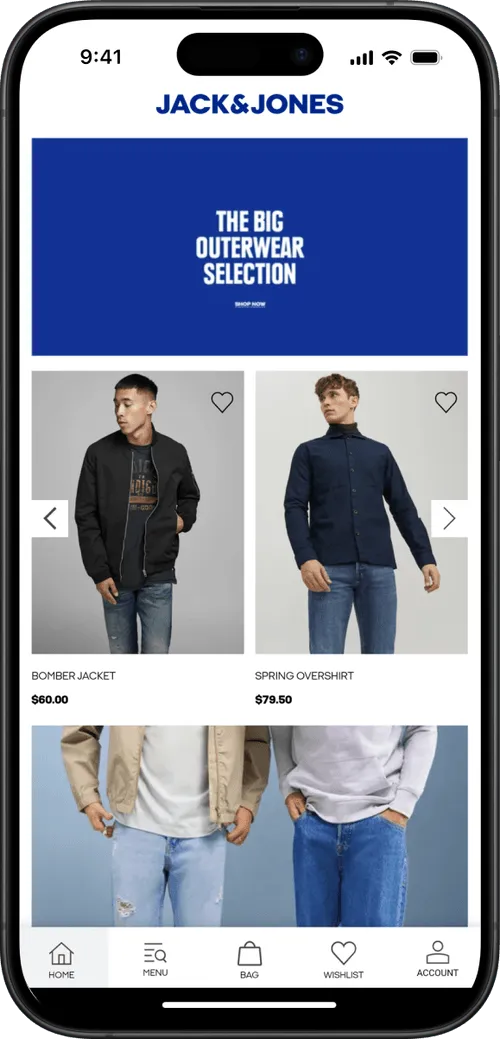Web App vs Website: What’s the Difference?
- The distinction between the terms website vs web app is somewhat gray, and realistically doesn't matter too much.
- Websites are generally a collection of static web pages, which serve the same content to every user.
- Web applications or web apps are more dynamic in nature, utilizing user interactions to perform more complex tasks.
- The distinction between the terms website vs web app is somewhat gray, and realistically doesn't matter too much.
- Websites are generally a collection of static web pages, which serve the same content to every user.
- Web applications or web apps are more dynamic in nature, utilizing user interactions to perform more complex tasks.
The terms “web app” and “website” are often used interchangeably, and it can be hard to pinpoint what the difference is.
While the terminology doesn’t matter to the end user, if you’re planning to build a web-based project, it’s helpful to understand the difference in order to figure out the best development approach to go with.
Read on to learn more about websites and web applications, and what makes a website and web application different.
What is a Website?
In simplest terms, a website is a collection of web pages that can be accessed by entering a URL into a web browser like Safari or Firefox.
Websites are made up of files hosted by a web server. When a web user puts a specific URL into their browser, the browser communicates with the web server to retrieve the necessary files and serve it to the user in a visual format.

These files are mostly HTML and CSS files, along with some JavaScript.
Generally, when we talk about websites, we’re talking about static websites. Static websites serve the same content and the same experience to each visitor, largely unchanging throughout the length of time the user is on the site.
But dynamic websites are becoming more common today, which serve a more interactive experience, changing depending on the user’s actions, and utilizing more JavaScript code than a static website does.
It's up for debate whether dynamic websites should actually be defined as web applications - and it's unclear where exactly the line should be drawn, as the distinction between a website and a web app is largely subjective.
Examples of Websites
Traditional websites are everywhere.
Mobiloud.com (where you are now) is a website. So are:
- News sites (e.g. cnn.com, nytimes.com, espn.com)
- Blogs and content sites (e.g. healthline.com, theverge.com)
- Business websites (e.g. shopify.com, microsoft.com)
- Ecommerce websites (e.g. amazon.com, nike.com)
Some would argue that social media sites like Facebook and LinkedIn and video sites like YouTube and Twitch are websites, some would argue that their interactive nature means that they should actually be classified as web applications.
Some would also say that an ecommerce site is actually a web app, since it relies strongly on a user’s input and interaction.
When it comes down to it, every property that’s accessed through a URL in a web browser is technically a website, including all web apps. But if we’re forced to make a distinction between a “website” and a “web app”, there’s no clear consensus for where to draw the line.
What is a Web Application? (Web App)
A web application, or web app, is a software application that’s accessible by entering a URL into a web browser.
Web applications are fundamentally the same as websites in many ways - and most would agree that web apps are a subset of websites (i.e. all web apps are websites, but not all websites are web apps).
However, web apps are generally designed to be complex and interactive, and offer a dynamic experience to each user. Instead of delivering static content, web apps take user input and process that input to perform higher-level functions and tasks.

Examples of Web Apps
Some notable and popular web applications include:
- Google Workspace tools (e.g. Google Docs, Google Sheets, Gmail)
- Canva
- Notion
- Trello
- Discord
- Chat GPT
It’s important to note that many businesses operate with both a web app and website, often from a single domain.
For example, if you go to canva.com or notion.com and you’re not a user, you’ll see a static website marketing their product.
But if you log in, you’ll see a dynamic and interactive web app, often hosted at the same domain (though a lot of SaaS tools separate the app and website by using a subdomain, such as app.domain.com).
As we mentioned in the section on websites, most would consider sites like Facebook, YouTube, TikTok, LinkedIn and Twitch to be web apps, as well as web forums, like Reddit and Stack Overflow.
Similarities Between a Web App and Website
There’s a lot of overlap between web apps and websites:
- Both require an internet connection to view, and are accessed by entering a URL into a web browser.
- Both have cross-platform functionality, able to be used on different devices (e.g. mobile and desktop), operating systems (e.g. Windows, Android, iOS) and browsers (e.g. Safari, Firefox).
- The core programming languages used to build websites and web applications are generally the same (unlike web apps and mobile apps, for example, which use completely different languages).
In fact we’d argue that, when comparing a web app vs website, most details are actually the same, and the differences are relatively minor or subjective.
What’s the Difference Between a Website and a Web Application?
So what is the difference between the two?
Realistically, the difference is just semantics, and not actually that important. You’ll find each person has their own definition of where a website becomes a web app.
For example, let’s look at replies on Stack Overflow to the question “What's the difference between a web site and a web application?” to see the range of opinions you’ll receive:
- “A couple of thousand dollars.”
- “The same as the difference between a cell phone and a smartphone.”
- “So basically a web application is a subset of the other?”
- “I think it is more like a website is a subset of a web application.”
- “Stackoverflow.com is a website. Facebook notification system is a web application.”
- “I would consider stackoverflow.com to be an application because it relies on the input of the users to do a specific task (provide answers to programming questions), not the input of one entity to control its content.”
- “This is totally personal and subjective. A website consists of most and purely static operations. Whereas an App is a set of functions that provide advanced functionality to a sites content.”
Providing a clear answer is not easy. But let’s look at a few commonly accepted differences between a traditional website and a web application.
Functionality
Web applications usually provide more functionality than a website.
Traditional websites serve static content, which the user passively consumes. Web apps are built to provide a functional purpose, such as data processing, storage and manipulation, peer to peer communication, generating and editing visual content, or providing interactive experiences (like games).
Think of it this way; a website is like a book, while a web app is more like a machine, which performs functions and tasks based on the user’s actions.
User Interaction
The most obvious difference between a web app vs website is in user engagement.
A user can generally interact with a web app, whereas a traditional static website is mostly read-only (outside of some small interactive features, like a button or a form).
Web apps take an input and provide a dynamic output based on the user’s actions. In some cases, a web application might not do anything without a user’s input (think of a blank Google doc - nothing happens until the user types something).

Websites, on the other hand, are usually purely informational. They provide content that users can read, but it’s a one-way street; the user can’t directly change what they’re seeing on the screen.
Programming Languages
Websites are almost always written in HTML and CSS, with JavaScript to add some more dynamic elements to web pages.
In web application development, HTML and CSS are still used as a foundation, but developers may use a wider range of programming languages to create dynamic web applications with more complex functionality.
They may do all of this with JavaScript, in which case the backend code may not differ drastically from a traditional website.
However, web apps may also utilize languages like Python, PHP, C#, TypeScript, Ruby and Java, depending on the level and type of functionality required.
Additional Tools and Frameworks Used
Both web apps and websites are often built with the help of other tools beyond their base programming languages.
Many websites use a content management system, or CMS, that enables publishing and editing of content without directly interacting with the website’s code.
Popular content management systems include:
- WordPress
- Shopify
- Squarespace
Web apps might use frameworks and libraries that extend the functionality of certain programming languages, or simplify building and deploying of certain elements.
Common web app frameworks include:
- JavaScript frameworks (e.g. React, Vue, Angular)
- PHP frameworks (e.g. Laravel)
- Python frameworks (Django, Flask)
- Ruby on Rails (an extension of the Ruby programming language)
Have a web app built with one of these frameworks? Click here to see how your web app can be converted to a mobile app in under two weeks.
Cost & Time to Launch
Websites are usually simpler under the hood, and thus cheaper and quicker to launch.
HTML and CSS are two of the easiest and most widely known programming languages, making it fairly easy to code a simple static website.
It’s even quicker and cheaper using a CMS; you could feasibly get a website up and running, from scratch, in a matter of hours.
Web apps (depending on the level of functionality) are likely to take more work and more specific expertise to build.
Thus it will usually take longer to launch, and require more skilled developers, which will mean a higher cost.
Security
The interactive nature of web apps mean they can be more open to security breaches and vulnerabilities.
With a higher level of user interaction, there's a higher chance for users to gain access to sensitive data, or feed code that harms the site or other users.
On the other hand, websites have fewer opportunities for bad actors to inject malicious code, especially if they use a secure HTTPS server connection.
This doesn't mean that all web apps are open to hacking and manipulation, but just that you need to pay closer attention to security when building an interactive web app.
Discoverability
A traditional static website is usually easier to rank in Google, since a simple HTML page structure is easier for Google to crawl and understand.
Web apps (particularly more dynamic and interactive apps) tend to be less discoverable in search engines. Single-Page Applications (SPAs), for example, are very hard for a search engine like Google to read, due to the way in which they use JavaScript to dynamically serve content.
That’s not to say that web apps are not at all discoverable. Static web applications are easy to rank just like regular websites.
Progressive Web Apps (a more enhanced, more functional version of a typical website) can be SEO-optimized, and they can also (in some cases) be published to major app stores, which is an acquisition channel that is not possible with a simple static website.
Website vs Web App: Which One is Right for Your Project?
Let’s look at how you should approach this if you’re looking to build a web-based project.
Should your project be a website? Or a web app? Here’s a general guideline to work from.
Create a website if:
- Your project largely consists of static content, passively consumed.
- You want to launch with lower cost and in less time.
- You don’t need any majorly complex features.
- You anticipate SEO as a major discovery channel for your project.
Build a web app if:
- Your project is more interactive in nature.
- You have the budget or expertise to build features with more specialized languages/frameworks.
- You’re ready to use channels other than Google SEO to get users.
However, with this in mind, you’re not necessarily deciding between a web app and a website. The decision should be more in what kind of programming languages, frameworks and other tools you use to construct your site or app.
There’s no point where you’ll need to label it as a “website” or a “web app”. Your users don’t care. They only care about the experience they have with your site/app.
Web App vs Website vs Mobile App
A more relevant question is deciding between a web app (or website) and a mobile app.
These two platforms are much more distinct, and have a real effect on your users’ experience.
However, MobiLoud means you have no need to choose one or the other. We let you convert your website or web app, complete with all its original content, design and features, into mobile apps that look and feel like million-dollar, custom-built apps.

Once you’ve built your website or app, get in touch with us to learn how we can help you turn your website into a native mobile app, for little cost, in as little as two weeks.
Get a free preview of your app, or schedule a free, personalized demo and get a first-hand look at the platform's possibilities with one of our app experts.
FAQs
Convert your website into a mobile app












